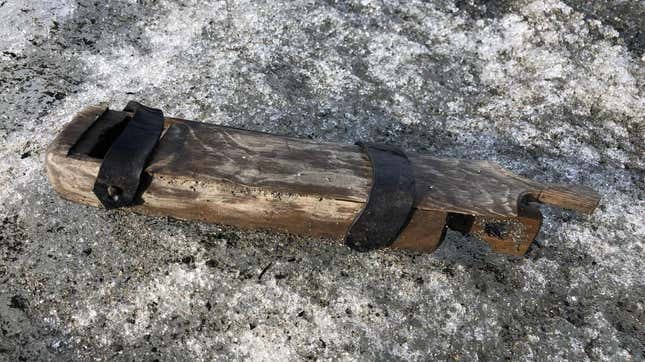
Melting glacial ice along a mountain passageway in Norway has resulted in the discovery of hundreds of ancient artifacts. One of these items, a wooden box with the lid still firmly in place, has finally been opened, revealing its precious contents.
Bits of beeswax. Yep, the wooden box was holding a plain old candle. Not gold, not jewelry, not a book of spells—just a beeswax candle.
Now, a candle might seem like an anti-climactic thing to discover, and perhaps it is, but this artifact and its well-preserved box tell an interesting story nonetheless—one having to do with annual treks made across a well-traveled mountain pass.

The Lendbreen ice patch, located in Oppland Country, Norway, was first discovered by glacial archaeologists in 2011, and it is slowly but inexorably revealing a record of use that spans 1,200 years. Glacial ice has preserved organic objects made from wood, leather, bone, and wool, and global warming is now making them visible to archaeologists. The variety of items found on this passageway is astounding: things like Viking spears, a tunic made from wool, horse snowshoes, mittens, shoes, walking sticks, knives, dog leashes, and even the remnants of a dog.
And of course, the wooden box, described on The Secrets of the Ice Facebook page as “one of the most awesome finds we have discovered from the melting ice.” Archaeologists with the group, more formally known as the Glacier Archaeology Program in Innlandet, were curious to know the age of the box, the type of wood used to make it, and of course, its cargo.
Radiocarbon dating places the box to between 1475 CE and 1635 CE. So at between 546 and 386 years old, it’s actually not that ancient, and it postdates the Viking Age by at least 400 years. The box itself was made from pine, and it held the remnants of a beeswax candle, as an analysis performed at the Museum of Cultural History in Oslo revealed.
“Now we know that such candle boxes were used way back in time,” the researchers explained. “It also fits well with what we know about the nature of the traffic through the Lendbreen pass.”
Indeed, these boxes were used by farmers to transport candles from their main farms to their summer farms. A post from the History Blog adds color to this practice:
Candle boxes were commonly used in Norway to transport expensive beeswax candles between seasonal farms. This was a practical aspect of the Norwegian practice of seterbruk, or summer pasture farming. Farmers would move their livestock from their home farms to summer pastures to graze. The summer farms had spartan living quarters where caretakers, usually just two people, a cattle hand and a milk maid, would stay for the whole season while they tended to the stock, milking the animals and making dairy products on site. This practice maximized the limited resources of a cold, forested and mountainous country, giving farmers access to larger grazing areas not available on the home farm and allowing them to harvest hay and fodder to supply the farm during the long winter.
So the candles were an important resource! And the candle boxes held and protected these items during the journey. Once at their summer farms, these candles provided the sole source of interior illumination at night, as the farmers worked from early spring until the fall. The farmers probably packed as lightly as possible for the long trek across the mountain pass, with the candle boxes holding an essential item.
Sure—the wooden box didn’t store any treasure by modern standards. But its contents, though a mundane household item, can hardly be called a disappointment. For archaeologists, there’s virtually nothing from the past that can be characterized as a letdown.
More: Melting ice exposes mountain pass used by Vikings, including ancient dog and leash.